First Master of Tranquility Grange
Lincolnville, Maine
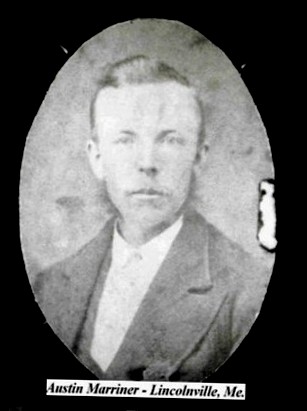
Austin Marriner lived a simple life on the hill in Millertown. He was born in 1846 in the house built by his grandfather, Joseph Mariner. The land was homesteaded before the incorporation of the Town of Lincolnville in 1802. It was then called New Canaan. The Bible describes the Land of Canaan, as a good land, a land of plenty, of grain, fruit and honey. The old farm had provided a good living for the generations who had lived there. The Mariners [as it had been spelled in the old days] had come up from Bath [now Maine] about 1777. Naler, Austin’s great-grandfather, with his sons, Jonathan and Philip, settled on adjoining lands. Philip left his homestead early, moving to Searsmont.
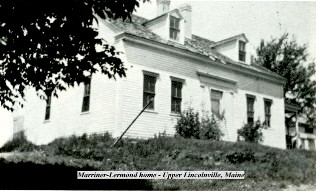 Naler
had built a log cabin behind the present house. The
indentation was still visible in the ground. The property
passed from Naler and Ruth Mariner to their son Joseph
Mariner, who in turn passed it on the William and Sarah
(Jackson) Marriner. Austin had inherited it from his father,
William, intending to pass it on to a son, but that was not
to be.
Naler
had built a log cabin behind the present house. The
indentation was still visible in the ground. The property
passed from Naler and Ruth Mariner to their son Joseph
Mariner, who in turn passed it on the William and Sarah
(Jackson) Marriner. Austin had inherited it from his father,
William, intending to pass it on to a son, but that was not
to be.
Though the house was situated on a hill, the farm land and fields were flat. Over the years, clearing the fields of rock, to plant crops, the long stone walls had evolved.
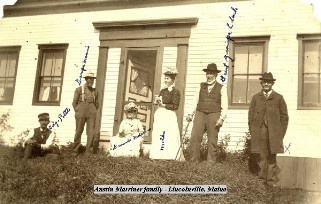 Many
of the neighbors were related, all descendants of the early
settlers of the town. Austin brought his bride, Callie
Clark, from down on Clark’s Corner to the farm in 1873,
after being married by J. D. Tucker, Esq. It was nine years
before their only child, Annie Maria was born. Austin
enjoyed teasing Annie, calling her “Annie ‘Ria”.
Many
of the neighbors were related, all descendants of the early
settlers of the town. Austin brought his bride, Callie
Clark, from down on Clark’s Corner to the farm in 1873,
after being married by J. D. Tucker, Esq. It was nine years
before their only child, Annie Maria was born. Austin
enjoyed teasing Annie, calling her “Annie ‘Ria”.
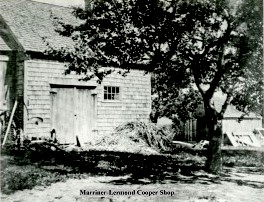 Austin
was an active farmer, planting crops as well as many kinds
of apple and pear trees, which he took great pride in. He
made barrels in his cooper shop, on rainy days, and in cold,
wintry weather. He shipped his apples and farm produce on
the Boston Steamers for Massachusetts markets in his
well-made barrels. He also made casks for the lime industry
and his own cider-vinegar production. Austin himself was a
temperance man, who did not indulge in alcohol.
Austin
was an active farmer, planting crops as well as many kinds
of apple and pear trees, which he took great pride in. He
made barrels in his cooper shop, on rainy days, and in cold,
wintry weather. He shipped his apples and farm produce on
the Boston Steamers for Massachusetts markets in his
well-made barrels. He also made casks for the lime industry
and his own cider-vinegar production. Austin himself was a
temperance man, who did not indulge in alcohol.
Austin was known as being a strong-willed and stubborn man. His son-in-law, Rich, told the story of Austin and his horse Bill. Rich said that Austin led the horse from his stall in the barn to the watering trough twice a day. If Bill did not drink, he would not have water for the rest of the day. It seems that Bill was as ornery as Austin. When Bill refused to drink, Austin pushed his head into the trough. Bill still didn’t drink, so Austin held his head down until he did drink. Rich said that the old saying, “You can lead a horse to water but you can’t make him drink” wasn’t so. Austin proved that “you can make him drink”.
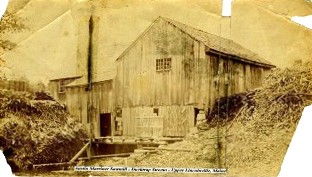 Austin
had a sawmill in the former Farmer’s Pride District, now
called the Grange. He sawed out long lumber, staves and
barrel headings, employing several local men. He later sold
his mill to Gould, who had settled in the area.
Austin
had a sawmill in the former Farmer’s Pride District, now
called the Grange. He sawed out long lumber, staves and
barrel headings, employing several local men. He later sold
his mill to Gould, who had settled in the area.
Austin had heard about a movement that started in the mid-western part of the country, by an activist, Oliver Hudson Kelley, called The Grange. The theory of Kelley was that farmers, scattered across the Nation, needed a national organization to represent them at State and local levels. Farmers were the backbone of the country, and were being taken advantage of by merchants, who would buy their goods, and in turn sold them supplies to keep their farms running smoothly. The shipping companies also took advantage of the farmers.
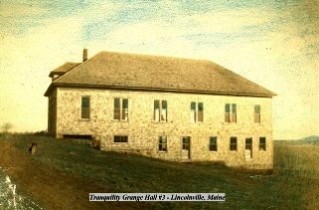 Kelley
and friends organized a fraternal group called the Order of
Patrons of Husbandry, commonly called ‘The Grange‘, taken
from a Latin word meaning grain or granary. Austin was a
enterprising, progressive farmer who believed in the tenets
of the fledgling secret society.
Kelley
and friends organized a fraternal group called the Order of
Patrons of Husbandry, commonly called ‘The Grange‘, taken
from a Latin word meaning grain or granary. Austin was a
enterprising, progressive farmer who believed in the tenets
of the fledgling secret society.
The Granges began organizing in Maine, about 1874. Mystic Grange in Belmont organized and built a large hall and Grange store in 1876. Farmer’s Pride Grange in upper Lincolnville organized about the same time, near the Northport town line. Austin had attended the local Granges. Farmer’s Pride Grange had an active membership, but had the misfortune to have their hall burn in 1901. Many of their members came from Northport, making it more convenient for them to join and attend the Grange in that town.
Twenty-seven of Austin’s neighbors and friends met in the Old Town House on April 28th 1898 for the purpose of organizing a Grange to be called Tranquility, the 344th Grange in the State of Maine. Austin was installed as the first Master of the Grange, an office which he held in 1898, 1899 and 1900. Annie kept the log book. A few of former Farmer’s Pride members joined with them.
About a years after organization, Tranquility felt the need to have a hall of their own. John C. and Eva J. Dean, who lived down the road from Austin, owned a piece of property about a mile from the Centre. They offered it to the Grange for $50. The group raised money, working and saving until they had enough to start their own building in 1903. It was a large Gabriel-roofed building, which the members were extremely proud of.
The beautiful large hall was completed in the late summer of 1904, having volunteer material and labor, as well as paid carpenters, with J. S. Miller as the foreman. David McCobb served as Master.
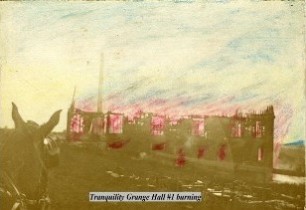 But
their joy was short-lived. The building burned nearly to the
ground. Arne Knight, who lived close to the hall, raced up
bareback on his horse. Others gathered at the scene. Because
the windows had only been pegged in, the men braved the
heat, pulling out windows, chairs, tables and benches. The
Grange members were just thankful that no one had been
seriously hurt in the conflagration.
But
their joy was short-lived. The building burned nearly to the
ground. Arne Knight, who lived close to the hall, raced up
bareback on his horse. Others gathered at the scene. Because
the windows had only been pegged in, the men braved the
heat, pulling out windows, chairs, tables and benches. The
Grange members were just thankful that no one had been
seriously hurt in the conflagration.
The hardy group again met at the Town House, where their meager building materials were stored. Some wanted to give up the idea of having their own hall. Austin was among those who vowed to press forward.
Once again, after cleaning up the debris, the stout-hearted group hired carpenters and workers, as well as volunteering as much of their time as could be spared from the home farms. The women kept the food coming, with encouraging words. Austin, Caroline, Annie and her husband, Rich Lermond put in as much time as possible It was late Spring, and there was much to do at home on the farm.
The second building was smaller than the first. The farmers could not spare a lot of their hard-earned profits to put back into the building. The hall was nearly ready for the plasterers to finish the inside, when the unspeakable happened. On the 25th day of May, 1908, came the word, the Grange is burning. Tranquility was not all tranquil. Austin and Callie drove down to the spot where they had all worked so hard for so long, now just a pile of burning embers. Austin’s heart was breaking, Callie held back the tears. Their daughter, Annie with her husband Richard, and three little girls, Mildred, Callie and Mary drove in behind them in their buggy. Annie wept openly. It had all seemed so fruitless.
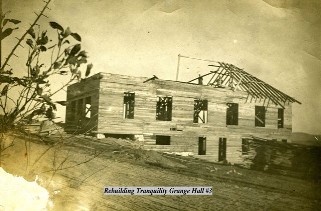 This
time the fire was obviously of a suspicious origin. All of
the evidence pointed to one of their neighbors, and a
relative of Callie’s. Surely, no one could dislike the group
that much. The case was taken to court, but apparently
nothing came of the accusations.
This
time the fire was obviously of a suspicious origin. All of
the evidence pointed to one of their neighbors, and a
relative of Callie’s. Surely, no one could dislike the group
that much. The case was taken to court, but apparently
nothing came of the accusations.
In the early Fall of 1908, the disheartening task of rebuilding Tranquility Grange Hall commenced. The carpenters and volunteer builders worked through the fall and winter. In January of 1909, the beautiful new edifice was ready for the hardy group to settle into. Instead of plastered walls and ceilings, the group had installed lovely pressed metal. The ceiling was domed with a striking metal design which had been tastefully painted with multiple colors.
Austin was a member of the famed Lincolnville Band, founded by Dr. B. F. Young, who had been selling organs at the time. Young, while traveling about the countryside in his business, had happened upon some old brass instruments. Dr. Young was very talented, teaching the young men in his Youngtown neighborhood to play, many of whom were Youngs and Heals.
Austin’s grandmother was Abigail Heal. He, too, inherited some of the musical ability. In 1879, they organized as a band with fifteen members. As the little band grew, they were called upon to play for dances, political rallies, and boating excursions. They decided that it was time for them to have uniforms. Around town, many of the old Civil War veterans had uniforms which they no longer needed or wanted. They were modified to fit the members. Now when they played, they were all clad in classy royal-blue uniforms.
The Band was well received everywhere, but never more so, as when they headed up a Grand Army delegation, playing at the Encampment in Boston around 1890. Amasa Heal later wrote abut the event, refreshing the memories of those who attended. They were the only band that sang as they played and marched, receiving encore after encore. There were eighty bands present, some very large. Lincolnville Band had seventeen members attending that day.
When they stopped before the President’s stand and sang, “The Vacant Chair”, the ovation rang through the rafters, stealing the show, and bringing them praise in the Boston newspapers. Relatives and friends from the Boston Area kept sending them newspaper clippings about the Lincolnville Band.
Austin had joined and was a member in good standing of the Mt. Battie Lodge, I. O. O. F. in Camden, as well as his Grange membership. Austin’s cousin, Allen Miller, and he were both active Democrats, attending the State Convention in Augusta together. They also attended meetings of the State Grange there.
In the Spring of 1915, Austin came down sick with the influenza, from which he never fully recovered. Effie Dickey reported in her newspaper column in 1916, “Like a bolt from a clear sky came the news over the phone on Wednesday, Feb. 9th, announcing the death of Mr. Austin Marriner, who sustained a shock on that morning from which he never rallied. His attending physician, Dr. E. F. Gould, when called said that death was but a matter of a few hours, and he died at noon.”
She also reported, “He was an honest and upright citizen, strong in his ideas and convictions, and no member of the community could be more widely missed. He was deeply interested in all public and town affairs, and in politics was a staunch Democrat.”
Austin’s funeral was held in the home where he had been born, lived his entire life, and died. The funeral was well attended with a display of beautiful floral tributes. Rev. Sylvanus E. Frohock officiated at the funeral. Austin was laid to rest in the Union Cemetery, where his parents, grand and great-grandparents rested, beside his beloved Callie, who had died in 1905, at the age of fifty-one years. He was sixty-nine years of age, living life to the fullest and making a difference in the town settled by his forefathers.
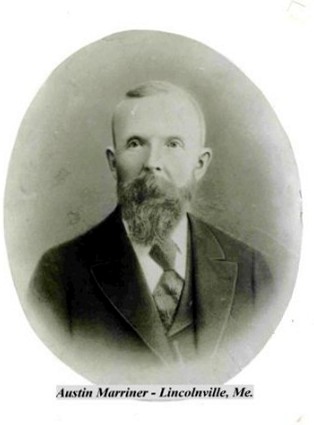
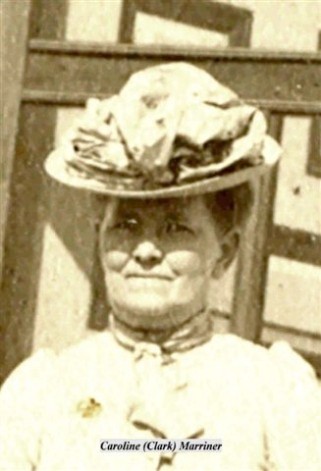
Austin Marriner
1845 - 1916
married
1 Mar 1873
